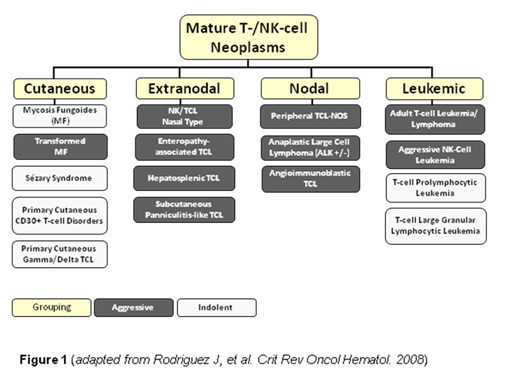Peripheral T-cell Lymphoma-Not-Otherwise-Specified on:
[Wikipedia]
[Google]
[Amazon]
 Peripheral T-cell lymphoma not otherwise specified (PTCL-NOS), is a subtype of
Peripheral T-cell lymphoma not otherwise specified (PTCL-NOS), is a subtype of
 Peripheral T-cell lymphoma not otherwise specified (PTCL-NOS), is a subtype of
Peripheral T-cell lymphoma not otherwise specified (PTCL-NOS), is a subtype of peripheral T-cell lymphoma
Peripheral T-cell lymphoma refers to a group of T-cell lymphomas that develop away from the thymus or bone marrow.
Examples include:
* Cutaneous T-cell lymphomas
* Angioimmunoblastic T-cell lymphoma
* Extranodal natural killer/T-cell lymphoma, ...
. Peripheral T-cell lymphoma (PTCL) is defined as a diverse group of aggressive lymphomas
Lymphoma is a group of blood and lymph tumors that develop from lymphocytes (a type of white blood cell). The name typically refers to just the cancerous versions rather than all such tumours. Signs and symptoms may include enlarged lymph node ...
that develop from mature-stage white blood cells called T-cells
T cells (also known as T lymphocytes) are an important part of the immune system and play a central role in the adaptive immune response. T cells can be distinguished from other lymphocytes by the presence of a T-cell receptor (TCR) on their cell ...
and natural killer cells (NK cells
Natural killer cells, also known as NK cells, are a type of cytotoxic lymphocyte critical to the innate immune system. They are a kind of large granular lymphocytes (LGL), and belong to the rapidly expanding family of known innate lymphoid cell ...
) (see figure for an overview of PTCL subtypes). PTCL is a type of non-Hodgkin's lymphoma
Non-Hodgkin lymphoma (NHL), also known as non-Hodgkin's lymphoma, is a group of blood cancers that includes all types of lymphomas except Hodgkin lymphomas. Symptoms include enlarged lymph nodes, fever, night sweats, weight loss, and tire ...
(NHL). PTCL specifically affects T-cells rather than B-cells
B cells, also known as B lymphocytes, are a type of the lymphocyte subtype. They function in the humoral immunity component of the adaptive immune system. B cells produce antibody molecules which may be either secreted or inserted into the plasm ...
, and results when T-cells develop and grow abnormally.
About 30% of PTCL-NOS cases exhibit malignant T cells that are infected with the Epstein-Barr virus (EBV). When associated with EBV, PTCL-NOS is classified as one of the Epstein-Barr virus-associated lymphoproliferative diseases (see Epstein-Barr virus-associated peripheral T cell lymphoma, not otherwise specified) but the relationship of EBV to the development and progression of Epstein-Barr virus-associated PTCL-NOS is unclear.
PTCL-NOS, the most common subtype of PTCL, is aggressive and predominantly nodal. There are two morphologic variants: the T-zone lymphoma variant and the lymphoepithelioid cell variant.
* T-zone lymphoma is so named for its involvement in a specific area of the lymph node that consists of a dense accumulation of T-cells.
* Lympho-epithelioid lymphoma, also called Lennert's lymphoma, is rare and generally affects older individuals.
Treatment
Currently PTCL is treated similarly to B-cell lymphomas. However, in recent years, scientists have developed techniques to better recognize the different types of lymphomas, such as PTCL. It is now understood that PTCL behaves differently from B-cell lymphomas and therapies are being developed that specifically target these types of lymphoma. Currently, however, there are no therapies approved by theUS Food and Drug Administration
The United States Food and Drug Administration (FDA or US FDA) is a federal agency of the Department of Health and Human Services. The FDA is responsible for protecting and promoting public health through the control and supervision of food ...
(FDA) specifically for PTCL. Anthracycline
Anthracyclines are a class of drugs used in cancer chemotherapy that are extracted from '' Streptomyces peucetius'' bacterium. These compounds are used to treat many cancers, including leukemias, lymphomas, breast, stomach, uterine, ovarian, b ...
-containing chemotherapy regimens are commonly offered as the initial therapy. Some patients may receive a stem cell transplant
Hematopoietic stem-cell transplantation (HSCT) is the transplantation of multipotent hematopoietic stem cells, usually derived from bone marrow, peripheral blood, or umbilical cord blood, in order to replicate inside a patient and produce a ...
. Novel approaches to the treatment of PTCL in the relapsed or refractory setting are under investigation.
Pralatrexate
Pralatrexate, sold under the brand name Folotyn, is a medication used for the treatment of relapsed or refractory peripheral T-cell lymphoma (PTCL).
Pralatrexate was approved for medical use in the United States in September 2009, as the first ...
and cerdulatinib are some of the compounds currently under investigations for the treatment of PTC.
References
External links
{{Lymphoid malignancy Non-Hodgkin lymphoma T cells